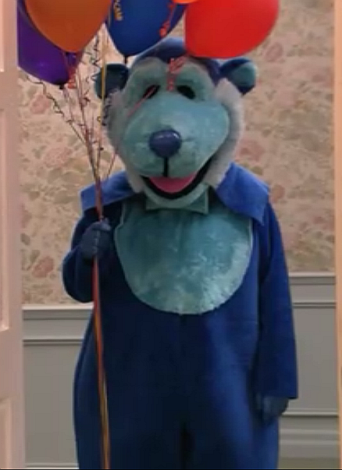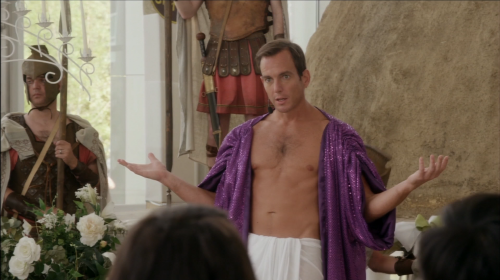
 1. Is Arrested Development a Christian show? At the risk of over-criticizing, if it weren’t, they probably wouldn’t have botched the ending the way they did. We all wanted les cousins dangereux to find love at last, but instead we witness a series of falls, especially with Michael and George Michael, up ’til now the show’s everymen/heroes, sinking further and further to pursue their own justification, most notably in a girl who thrives off neglect (see Always Sunny’s “DENNIS System” – but actually don’t). But perhaps the ending is so abrupt and disconcerting because Hurwitz is trying so much to make a point that it comes at the expense of his story – and this point has to do with the sort of low anthropology that possibly (‘Surely’) barred Arrested from commercial success in the first place (Spoiler Alert).
1. Is Arrested Development a Christian show? At the risk of over-criticizing, if it weren’t, they probably wouldn’t have botched the ending the way they did. We all wanted les cousins dangereux to find love at last, but instead we witness a series of falls, especially with Michael and George Michael, up ’til now the show’s everymen/heroes, sinking further and further to pursue their own justification, most notably in a girl who thrives off neglect (see Always Sunny’s “DENNIS System” – but actually don’t). But perhaps the ending is so abrupt and disconcerting because Hurwitz is trying so much to make a point that it comes at the expense of his story – and this point has to do with the sort of low anthropology that possibly (‘Surely’) barred Arrested from commercial success in the first place (Spoiler Alert).
2. Hereditary sin – seriously, Bluth family resemblance was one of Season 4’s in-your-face motifs, especially in terms of Michael being compared to his father and George Michael finally showing some gene expression of the family’s lying tendency/ability. We finally see that Michael is no different from his brothers and that George Michael, despite being raised by a great father with a well-honed moral compass, still becomes selfish as he grows up (c.f. Pelagius). And the clincher: Michael’s last line is, “It’s like we’re twins” – but this father/son resemblance, now in Season 4, is marked more by mutual deception than shared interests. Hurwitz also makes the point explicitly, in that last episode, that Michael’s continued pursuit of Rebel Alley is a classic G.O.B. move – family resemblances, indeed.
3. In one of the clumsiest moves of the series finale, ‘forget-me-now’ pills are strong-armed from recurring joke to central thematic symbol. Seriously. Michael could have told his son the truth, that he had willfully taken a forget-me-now so he wouldn’t have to deal with the moral consequences of the whole ‘Rebel Alley’ thing, but he had forgotten taking one, since he was on a ‘forget-me-now’ circle. The pills, funny up until now, wouldn’t take up so much space in the closing minutes were they not a device to emphasize human recidivism and willful self-deception. There’s no better example of the closed circle of human life than the ‘forget-me-now’ cycle of repetition without learning, without even moral recollection. But the symbol’s a sloppy one and, poorly and abruptly executed, it just feels like Hurwitz is spending way too much screentime on pills. One of the perils of making a theologically serious comedy: taking yourself too seriously and losing the comedy in a scene so abrupt as to be borderline sermonizing.
4. And the final action: George Michael punching his father in the face, right in the forehead. GM used to be an extension of his father’s moral compass, but he’s individuated in college. If we are ‘twins’ under the aspect of universally-distributed sinfulness, then our similarities will result in conflict (“of all against all”) as our desires for scarce resources (Rebel Alley) and contradictory ambitions (again, Rebel Alley), conflict. And with an incapacity for self-knowledge because of our propensity for forgetting our guilt, the other is always to blame, so conflict emerges.
5. This is the note Hurwitz leaves us on – but why does it have such a sudden (valley) ring to it, if not a false one? Maybe because there’s no redemption and, though good comes out of weakness through the comedy of the show, that’s thin consolation. Or maybe because Hurwitz pivoted a little too quickly on Michael and George Michael – even though the characters have a had a few years off, it seems too like Hurwitz himself has changed, perhaps growing more pessimistic to the point that even his best characters become more conspicuously flawed. But it seems like the pessimism has passed from humorous to gratuitous by the end of Season 4, and that makes his characters difficult to metabolize. Maybe the show’s brief flash of redemption is Michael’s disbelief as he and his son stare at each other outside Rebel’s apartment, perhaps (perhaps!) finally recognizing each other’s flaws and, therefore, their own. And that’s what the show tries to get its viewers to do but, in toeing the line between comedy and didactic parable, it stumbles a bit at the end.

COMMENTS
2 responses to “Stray Takeaways from Arrested Development Season 4”
Leave a Reply














Well said!
A brilliant, but sad, analysis. The fall of Michael and George Michael made the idiocy of Lindsay, George Sr., and even Tobias so much less bearable.